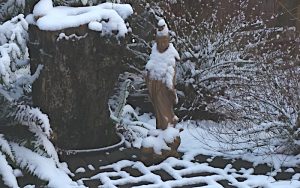I Am Not the Buddha And …
(To view the February 2019 newsletter where this was first published click here.)

In an early Journal of Shasta Abbey (before it was the Journal of the Order of Buddhist Contemplatives) Rev. Master Jiyu-Kennett published an article called “How to Find Kanzeon in Hell”. In it, she says “I am not the Cosmic Buddha and, there is nothing in me that is not of the Cosmic Buddha.” At other times she would say “I am not God, and there is nothing in me that is not of God”.
Only a very few of us might think to ourselves “I am God!” (fewer still might actually say that out loud), so how would this apply to us? While I want to be very careful not to imply that I fully know what she meant by these phrases, I do notice a thing that arises in my own mind where I might give expression to expectations of God-like power in myself. Think of that classic trope in fiction where some loved person is harmed or killed and the survivor is wracked by guilt thinking that they should have been able to protect the harmed one. In my own regular-life version of this I might think “I should have been smarter… more skillful… more energetic… ” (and on and on). We come to see (usually through some slightly – or more than slightly – bitter experience of life) that we are not really as important or powerful as we thought or hoped.
For most of us, there is a waking up to the truth that we are not God, in the all-powerful sense, and this can be disappointing (like, when we realize that, while we would like to change the world in a political or social or environmental way, we actually have very little power to do so). On another level, we might also wake up to the truth the God is not God either. God is not the god of our childish conception, the god that we hope will take away our suffering or the suffering of another. We wake up to these truths and we are confronted with a much more complicated situation then we thought.
It is more complicated and, because of our disappointment, we might go into bitterness or despair or selfish greed (I am going to get what I can, while I can because there really isn’t any point trying to improve things in the world or for ourselves). But we really do not have to get stuck in this negative place, we can go on to the knowledge that there is “nothing in me that is not of the Cosmic Buddha.”
When we let go of our despair and disappointment, and ask the question “what can I do?” we are beginning to express the truth that there is nothing in me that is not of the Buddha, of God. We are just a tiny part of existence, but we are a part, and we can take steps to help ourselves and others. We can’t change the reality of basic cause and effect, either on a physical level or a moral level, but we can help ourselves and others bear the consequences of causes, and to varying degrees, we can learn to create different effects. We just have to make the effort to do what we see needs to be done: we just have make the effort to try and not give up trying.
This is true internally as well as externally. We do what we can externally, but also, and maybe more importantly, we can take a step internally. This internal step may be more important because it can change our perspective and this change of perspective can make all the difference in us seeing clearly what can be done and it can help us to see that accepting things as they are, is its own positive step. By really facing ourselves and coming to see where we have misunderstood the nature of things and letting that misunderstanding go, we come to have a clearer sense of what it means to be of the Cosmic Buddha.


